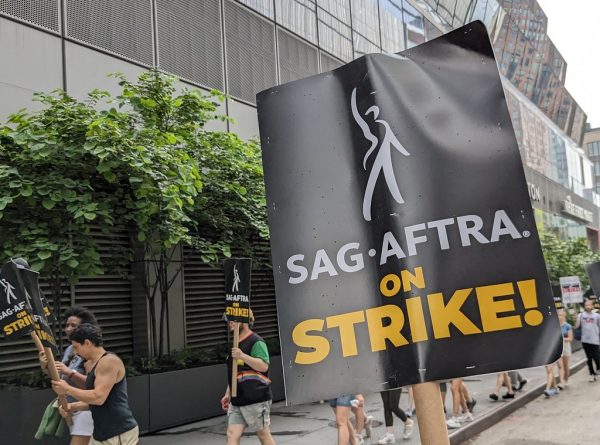Pandemic Prospects: Graduates Struggle to Find Jobs After COVID-19
Used from Flickr by Kentucky Unemployment Filings
An unemployment crisis. The pandemic is having a profound impact on the job market. In particular, college graduates are struggling to find employment amidst economic disruption. Long gone are the days of traditional employment and antiquated hiring practices.
November 3, 2021
The COVID-19 pandemic took its toll on the recent wave of college graduates – and the recovery isn’t happening as quickly as many had hoped.
The virus has rattled the state of the labor market, significantly disrupting the post-Great Recession growth from 2009. College graduates today enter a hyper-competitive workforce with crippling student debt in a fragile economy. As the nation continues to recover, firms are taking measures to saturate the job market. At the end of July, there were a total of 10.9 million job openings, a record high since December 2000.
Why, then, do so many young people still struggle to occupy these jobs?
According to the Pew Research Center, 31% of 2020 college grads are still unemployed. In exasperation, struggling former students will redesign their resumes, attend mock interviews, and sharpen their skills in order to stand out amidst increasing competition. One recent graduate took a unique approach to this process.
In July of 2021, Braden Martin, a graduate of Biola University, created Project Hire Me, an individualized, innovative platform for himself that allows him to showcase his skills in digital marketing through a social media campaign.
“Each [social media] piece is designed to be dual purpose: to help me stand out as an applicant for jobs and to explore alternative, creative methods of finding a job,” he writes.
For many like Martin, differentiating themselves has become a priority – particularly as higher education evolves.
In the year 2000, around 29% of the US population aged 25 and above had a bachelor’s degree. In 2019, this percentage skyrocketed to almost 40%.
With the increased saturation of seemingly qualified individuals, companies are giving increasing consideration to applicants’ level of experience. Recent graduates today are also competing with young, credentialed professionals who are rejoining the workforce after the pandemic. Thus, they are unable to keep up with this level of competition, as their work experience is generally minimal compared to their older counterparts.
Shifts in corporate structure and culture also haven’t made things easier for our recent graduates. In some industries, notably IT services, outsourcing is becoming increasingly common. The increase in remote job opportunities during the pandemic incentivized companies to hire cheaper employees from other countries.
Furthermore, industries dependent on face-to-face interactions experienced a huge shift in work culture, affecting the interaction between employees and clients, traveling, and firms’ expenses. These changes have affected the rates and types of hiring within many firms.
The Rise of Remote and Hybrid Work by shivani123.muru
Many such pandemic-related changes are creating a domino effect; as the economy worsens, firms tend to have less capital, which can translate into reduced hiring. This causes a rise in more freelancers, consultants, and part-time workers, resulting in less stable or inconsistent employment. In turn, there has been a shift in the value of higher education as it evolves from a differentiating factor into a necessity.
Recent graduates are currently facing the effects of this cycle as they partake in unique money-making ventures, take up part-time jobs, and create multiple streams of income. Furthermore, a new phenomenon called the “pandemic-delayed start” has caused 2020 hires to begin their training and jobs in as late as Quarter Four of 2021. This shift allows companies to wait until their finances and growth are at a more desirable stage before taking on more employees. For many job-seekers, this buffer time between hires’ graduation and their job’s start date can prove to be tumultuous.
However, there are several ways to mitigate the risk of unstable employment. For many graduates, their choice of major during their early college years impacts their career prospects. An analysis using data from the US Bureau of Labor and Statistics suggests that the college majors with the highest unemployment rates are: Mass Media (7.8%), Liberal Arts (6.7%), Anthropology (6.6%), and Philosophy (6.2%). In contrast, the majors which statistically provide the most job opportunities include Mechatronics Engineering, Business, Computer Science, Nursing, and Human Resources.
Therefore, in reference to future employment, college students should carefully consider their career trajectories and select an undergraduate major in alignment with industries that exhibit high growth potential.
Derived demand suggests that jobs are created by demand for goods and services. College students need to identify what will be in demand for the next few years.
— Mr. Miller, AP Economics Teacher
As of 2021, the industries projected to hire the most include healthcare, sales and customer service, and technology.
Due to the pandemic, the need for healthcare workers expanded, and this demand is only increasing. In particular, physicians and registered nurses are most highly sought after. Similarly, sales and customer service industries are increasing their hiring to account for the reopening of retailers and the rise of business-to-business (B2B) sales post-pandemic. Furthermore, the pandemic boosted video conferencing tools and e-commerce systems, increasing the demand for software developers and information security professionals. These job markets align directly with the most lucrative and recommended college majors.
College students today may face several roadblocks in finding employment, but they should make use of networking events, job fairs, and growing industries to mold a career path suitable for their interests and skills.
Georgia undergraduates can visit the Georgia Department of Labor’s website to view upcoming job fairs and connect with staffing agencies.










